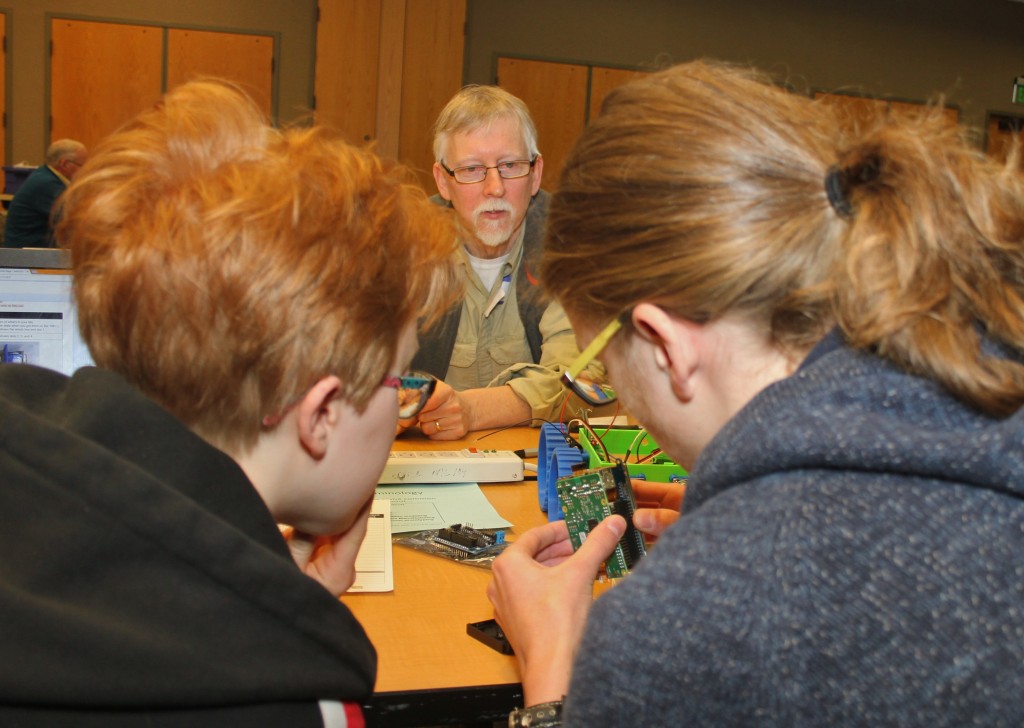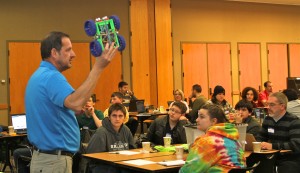
Manchester High School science teacher Mark West watches students Gi West, right,
and Jakob Rosskopf examine computer components of what will become the model of an
autonomous
vehicle. Photo by Lynn Monson
Area students, teachers get a glimpse of the future of transportation
Imagine a world where vehicles can communicate with each other and there are far fewer motor vehicle accidents as a result. Sounds like something straight out of a sci-fi script, right?
Maybe so, but the high-demand, cutting-edge technology that’s required to dramatically reduce the number of car collisions is already here and expected to be in full force in five to 20 years.
Recently, at Square One Education Network’s Connected Vehicle Workshop held at Washtenaw Community College, local high school teachers and their students got a taste of what’s to come in the world of connected and autonomous vehicle technology and wireless communication, with a focus on student-led learning and hands-on demonstrations.
Square One Education Network is a Michigan-based nonprofit foundation that’s dedicated to igniting student interest in STEM and it reaches 15,000 students annually, mainly through a variety of vehicle engineering competitions. Established in 1994, Square One has worked with schools throughout the entire state of Michigan.
“We’re exposing K-12 students to Science, Technology, Engineering and Math (STEM) fields, while also giving them an opportunity to then see firsthand how that science and technology is applied in connected and autonomous vehicle technology,” said WCC Advanced Transportation Center (ATC) Director Al Lecz. “Every year in the U.S., there are approximately 34,000 deaths caused by car collisions, so we’re talking about saving lives here and to do that, future skilled technician talent is greatly needed.”

Technology was on display throughout the day. Students and teachers sat at tables where they operated autonomous 3D printed mobile platforms with the sensors and software needed to communicate with other similar vehicles.
How does WCC play a role in all this? The ATC provides training needed to meet the demands of the latest advanced transportation technologies. The college is part of an educational pipeline that starts with K-12 students, who attend schools where STEM learning is emphasized, to a two-year institution like WCC, where students can earn a certificate or associate degree. They can continue in that pipeline by transferring to a four-year college or university, where they may pursue an engineering degree in related fields. Or they can find much-needed, well-paying jobs in the transportation tech industry with the two-year degree or certificate they’ve earned.
Someone needs to make sure the sophisticated computers and communication devices are providing driver collision warnings or literally driving cars are maintained and repaired. That’s what the Square One and WCC partnership is all about. “There’s not a lot being done right now to invite students into this space, so having this relationship with WCC is vital,” said Karl Klimek, executive director of Square One Education Network. “If Michigan wants to dominate this technology, it’s critical for us to find ways to collaborate. Otherwise, the technology and talent will move someplace else and greatly impact Michigan’s economy. That’s the big picture here.
“These students are the pioneers in delivering this smart technology that will ultimately change the way we drive not only in this country but around the world. That is precisely why we developed this Connected Vehicle program for K-12 schools.”
By Princess Gabbara
Writer, Public Relations
